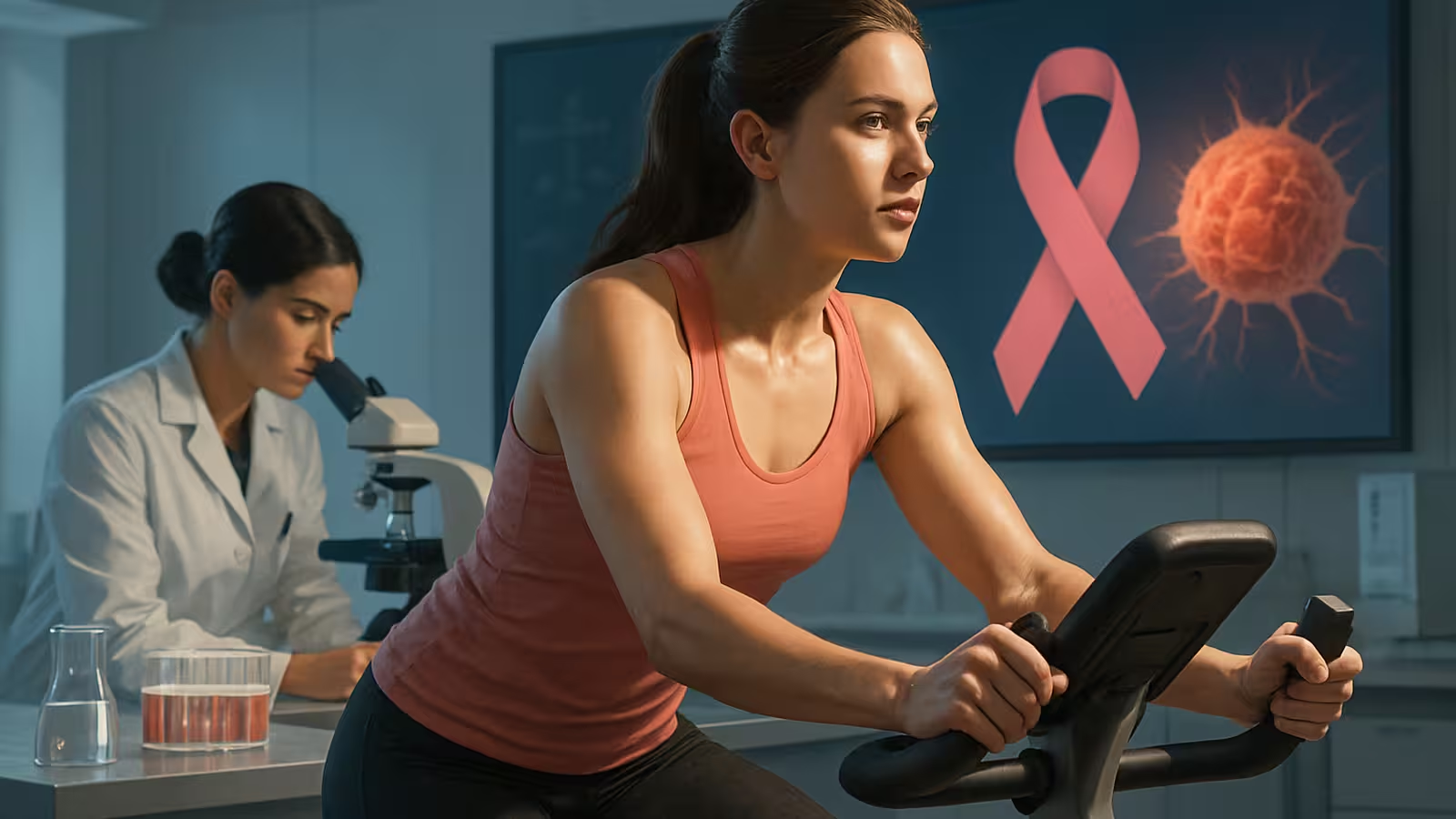4 Minutes
Exercise, Myokines and Breast Cancer: A concise overview
New experimental work indicates that a single session of structured physical activity can transiently flood the bloodstream with muscle-derived signaling proteins known as myokines, and that these proteins can reduce the growth of breast cancer cells in laboratory tests. The study evaluated 32 breast cancer survivors and compared the immediate biochemical effects of a 45-minute resistance-training bout with a 45-minute high-intensity interval training (HIIT) session. Blood samples taken before exercise, immediately after, and 30 minutes post-exercise revealed a short-term increase in several key myokines, notably decorin, interleukin-6 (IL-6), and SPARC.
Study design and experimental details
Participants were randomly allocated to one of two exercise protocols. The resistance training group performed multi-joint strength movements including chest presses, seated rows, shoulder presses, lat pulldowns, leg presses, leg extensions, leg curls and lunges. The HIIT group completed short intense intervals using stationary cycles, treadmills, rowing machines and cross-trainers. Plasma collected at three timepoints (pre-exercise, immediately post-exercise, and 30 minutes post-exercise) was applied to breast cancer cell cultures in vitro to test for direct effects on tumor-cell proliferation.
Biomarkers measured
The researchers focused on proteins secreted by skeletal muscle during contraction. These myokines play roles in metabolism, inflammation and tissue remodeling. In this trial, levels of decorin, IL-6 and SPARC rose acutely after both exercise modalities. When these exercise-conditioned blood samples were introduced to breast cancer cell lines, tumor growth was reduced by as much as 30% in laboratory assays.
Key findings and scientific context
One important observation was that exercise-conditioned plasma affected triple-negative breast cancer cells—tumors that lack estrogen, progesterone and HER2 receptors and typically do not respond to hormone-driven signaling. Because triple-negative cells were suppressed by the myokine-rich plasma, the effect appears independent of hormonal fluctuation and instead consistent with direct biochemical signaling from muscle-derived proteins.
Lead investigator Francesco Bettariga (Edith Cowan University) and colleagues emphasize that both resistance training and HIIT produced acute anti-tumor myokine responses. They suggest these changes could be part of biological pathways that help control cancer, and that the data provide motivation to consider exercise as an adjunct to cancer care. However, the team also notes that the clinical relevance for long-term recurrence risk in survivors remains to be established through longitudinal trials.
Implications, technologies, and future directions
These results add to a growing body of preclinical and translational research linking physical activity, myokine signaling and tumor biology. Future research priorities include identifying which myokines are causally responsible for anti-tumor effects, mapping their molecular targets, and testing whether repeated exercise interventions produce durable anti-cancer benefits for survivors. Clinical trials combining exercise prescriptions with standard oncology therapies could evaluate effects on recurrence, immune function, inflammation and patient quality of life.
Conclusion
Acute sessions of resistance training or HIIT in breast cancer survivors provoked measurable increases in circulating myokines—decorin, IL-6 and SPARC—that reduced tumor cell growth in laboratory assays. The findings support the hypothesis that exercise triggers muscle-to-tumor biochemical communication with anti-cancer potential. While promising, these laboratory results must be followed by longer-term clinical research to determine whether regular exercise can reduce recurrence or improve outcomes in breast cancer survivors.
Source: link.springer


Leave a Comment